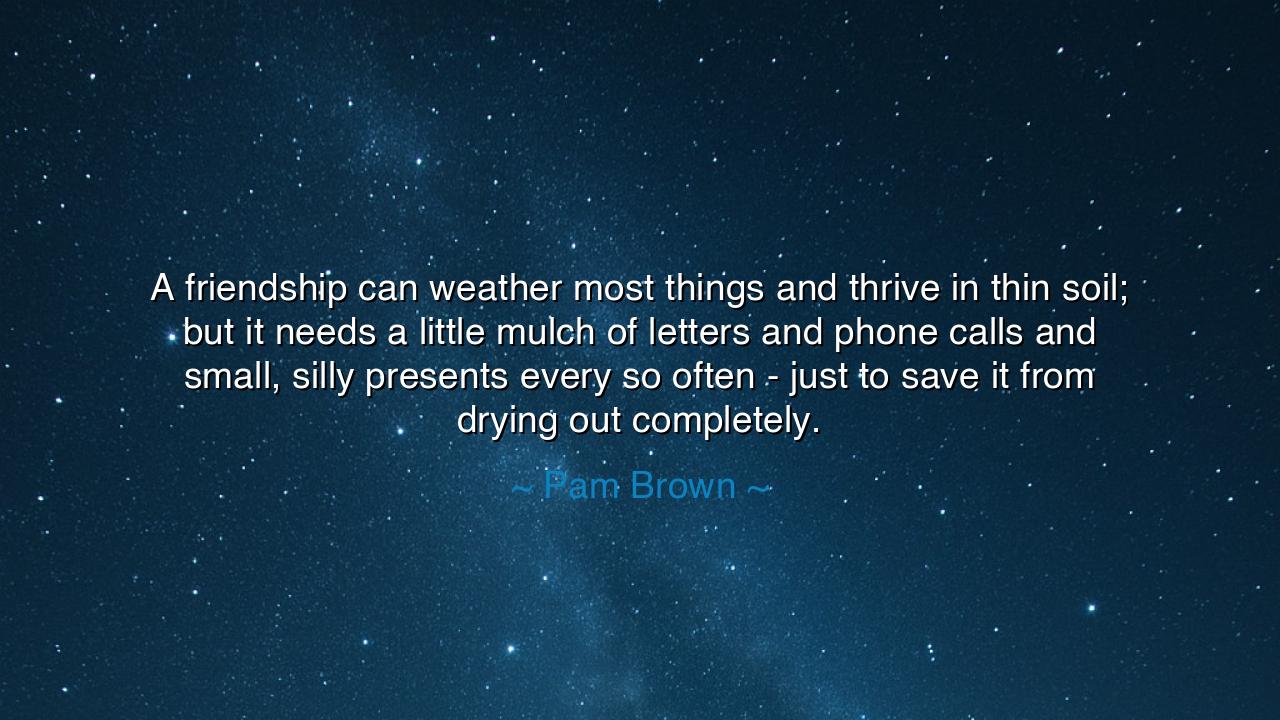
A friendship can weather most things and thrive in thin soil; but
A friendship can weather most things and thrive in thin soil; but it needs a little mulch of letters and phone calls and small, silly presents every so often - just to save it from drying out completely.






“A friendship can weather most things and thrive in thin soil; but it needs a little mulch of letters and phone calls and small, silly presents every so often — just to save it from drying out completely.” — thus wrote Pam Brown, the quiet poet of human affection, who understood that the heart, like a garden, needs tending. Her words are humble, yet within them lies a profound truth: that friendship, though resilient, is not indestructible. It can survive hardship, neglect, and distance — but not complete forgetfulness. For love between friends, like a living thing, endures best when nourished by the small, tender acts that remind the soul it is still seen, still cherished, still remembered.
In these words, Pam Brown paints friendship not as a monument of stone but as a living plant, one that can grow even in poor soil — through times of struggle, through misunderstanding, through separation. True friendship is hardy, she tells us. It can survive the droughts of life, the years when words are few and paths diverge. Yet even the strongest roots need a touch of care — the “mulch” of thoughtfulness, the small tokens that keep the bond warm. A letter written in haste, a gift chosen for laughter, a call made without reason — these are not grand gestures, but quiet offerings that sustain the spirit of friendship when time and distance threaten to make it fade.
History, too, offers us proof of this truth. Think of John Adams and Thomas Jefferson, those towering figures of the American age. Once allies in revolution, later estranged by politics and pride, they might have let their friendship die beneath the weight of silence. But years later, when both were old and frail, a letter arrived — the first of many. In that exchange of words, the ashes of their friendship stirred again to life. Over time, hundreds of letters passed between them, filled with memory, philosophy, humor, and forgiveness. And when at last they died — on the same day, July 4th, 1826 — their bond had been restored. The mulch of letters had kept their friendship alive to the very end.
In this, Pam Brown’s words carry both warmth and warning. She reminds us that love, even when true, is not immune to neglect. The friendship that once bloomed brightly can wither when left untended, not from betrayal but from simple silence. We assume that those we love will always know — that affection, once spoken, endures forever. But the heart, though faithful, needs reminders. Just as a lamp must be refilled with oil to keep burning, so too must friendship be replenished with the small gestures that whisper: I still care, I still remember, I still walk beside you, even from afar.
Her image of “thin soil” is especially beautiful, for it acknowledges that life often gives us little time, little space, little ease. Friends may live far apart; years may pass between meetings. Yet even in that thin soil, friendship can survive — if we take the time to add our mulch, however modest. A message, a shared joke, a birthday remembered — such acts are simple, yet they keep the ground of friendship moist with love. For in the garden of the soul, small kindnesses are the rain that keeps memory green.
There is a lesson here for all generations: do not take friendship for granted. Do not believe that love, once formed, needs no care. Friendship, like the earth, responds to attention. Write to your friends, even when you think they are too busy to answer. Call them, even when you have nothing important to say. Send the small, silly gifts that make them smile, for laughter is nourishment too. These gestures may seem trivial, but they are the language by which the heart says, You still matter to me.
Let this be the wisdom you pass down: tend to your friendships as the ancients tended their sacred fires. Keep them burning, not with grand sacrifice, but with steady devotion. Do not let the embers grow cold in the wind of time. For though friendship can endure neglect, it blossoms most beautifully under the warmth of remembrance.
So when you think of someone you have not spoken to in many seasons, think of Pam Brown’s words — and act. Send the letter. Make the call. Offer the little gift that carries laughter. For these are the mulches of the heart — humble, human, eternal — and through them, the gardens of friendship shall never die.






AAdministratorAdministrator
Welcome, honored guests. Please leave a comment, we will respond soon